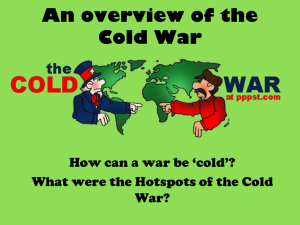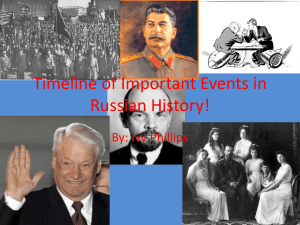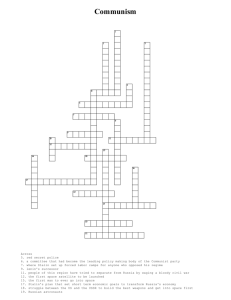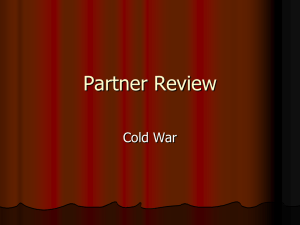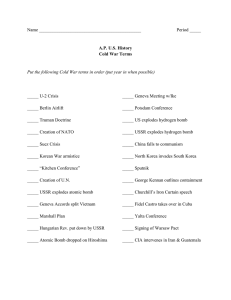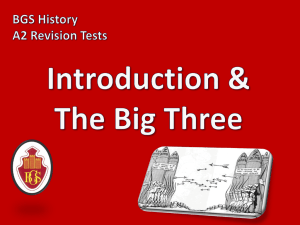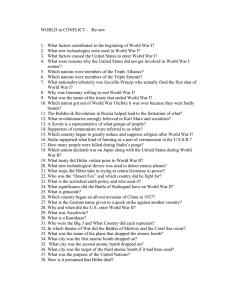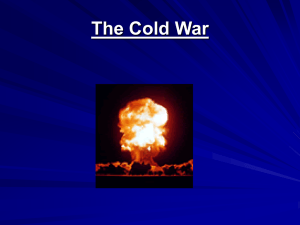war n peace 1 3 eng
advertisement
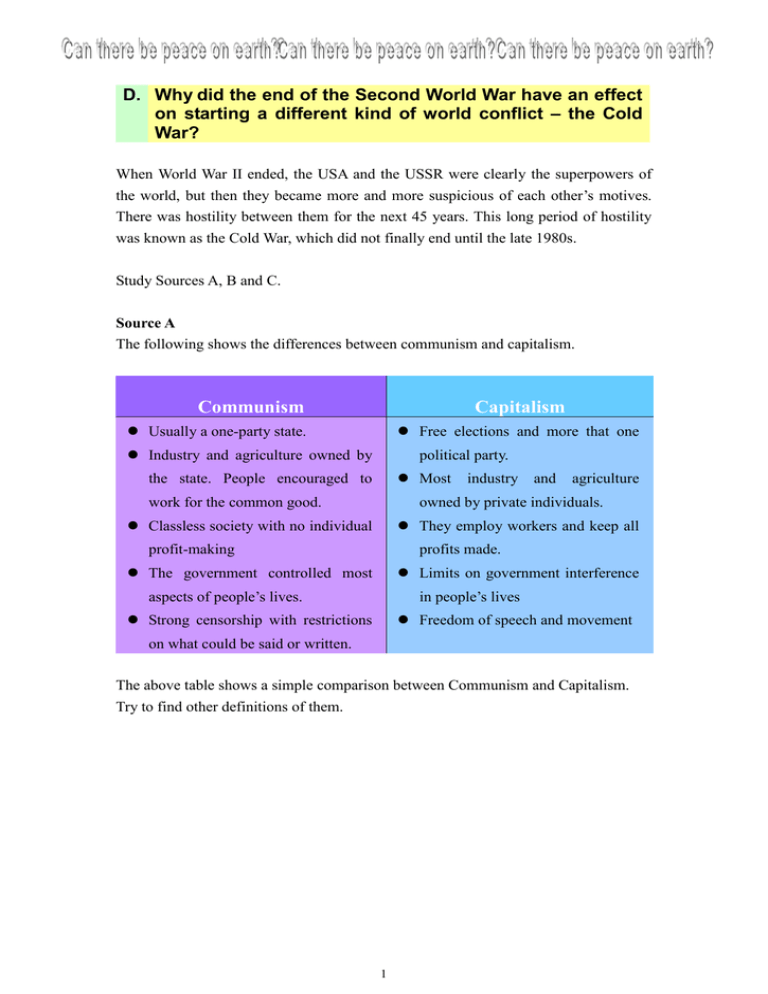
D. Why did the end of the Second World War have an effect on starting a different kind of world conflict – the Cold War? When World War II ended, the USA and the USSR were clearly the superpowers of the world, but then they became more and more suspicious of each other’s motives. There was hostility between them for the next 45 years. This long period of hostility was known as the Cold War, which did not finally end until the late 1980s. Study Sources A, B and C. Source A The following shows the differences between communism and capitalism. Communism Capitalism Usually a one-party state. Free elections and more that one Industry and agriculture owned by political party. Most the state. People encouraged to work for the common good. industry and agriculture owned by private individuals. Classless society with no individual They employ workers and keep all profit-making profits made. The government controlled most Limits on government interference aspects of people’s lives. in people’s lives Strong censorship with restrictions Freedom of speech and movement on what could be said or written. The above table shows a simple comparison between Communism and Capitalism. Try to find other definitions of them. 1 Source B The following shows why conflicts appeared between the capitalist bloc under the USA and the communist bloc under the USSR. USA and democratic countries of Western Europe USSR and communist countries of Eastern Europe Fear of communist attack Fear of communism Fear of attack from the West FEAR Fear of atomic bomb Fear of capitalism Fear of atomic bomb MISTRUST Mistrust of the Mistrust of the USSR’s intentions USA’s intentions 2 Source C The following was extracted from a conversation between Joseph Stalin and a fellow communist, Milovan Djilas in 1945. Perhaps you think that, because we are allies of the English, we have forgotten who they are and who Churchill is. They find nothing sweeter than to trick their allies. And Churchill? Churchill is the kind who, if you don’t watch him, will slip a kopek (USSR currency) out of your pocket…… And Roosevelt? Roosevelt is not like that. He dips his hand only for bigger coins. Source D The following was extracted from a commentary from US newsreel in 1946. Across the vast expanse of the globe there was famine, natural ruin…… Without help, recovery might never be achieved. In the background was the growing struggle between two great powers to shape the post-war world. Looking towards Europe from Moscow, Soviet Russia was expansively stabbing westwards, knifing into nations left empty by war, with misery and chaos as allies. 3 Source E The following shows the points of tension between the USA and the USSR at the end of World War II. Points of Tension The Atomic bomb Stalin distrusted the USA because: Truman, the US president, had not told him before using the atomic bomb. The USA refused to share the secret of how to make the atomic bomb. Eastern Europe The USSR did not allow free elections in Eastern Europe. The USSR began to impose Communist rule on occupied zone in Germany. The USA thought that the USSR wanted to control Eastern Europe and consolidate its influence there. Stalin thought that the USA would use the bomb to make herself a superpower The USA distrusted Stalin because: East and WestGermany1 The Western Allies wanted to help Germany to recover as soon as possible so that Germany could act as a buffer to Communist expansion. On the other hand, the USSR wanted a weak Germany. The Western Allies wanted free elections in the occupied zone in Germany. The USSR did not want free elections to be held in the Russian occupied zone. Stalin decided to develop the atomic bomb. The USA felt threatened by this. 1 East and West Germany: Before the end of the Second World War,the major Allied Powers, Britain, the United States and the Soviet Union, had held several meetings to sort out post-war arrangements. In the Potsdam Conference, 1945, it was confirmed that Germany was to be divided into four zones occupied by the Allied powers. In 1949, the US, British and French zones united as the Federal Republic of Germany (West Germany) with its capital in Bonn. It adopted a democratic government. The Soviet zone became the German Democratic Republic (East Germany) with its capital in Berlin. East Germany remained under the control of the communists. 4 Refer to Sources A to E Which Causes of the source(s) Cold War is / are related to this cause? Mutual mistrust B, C Cite one evidence from the source(s) you identified in the middle column of this table. Evidence from the sources Conflicting aims in Central and Eastern Europe D Evidence from the sources Difference in ideology A Evidence from the sources Soviet Russia’s expansion in Eastern Europe D Evidence from the sources The atomic bomb D Evidence from the sources You may like to study the following website to find more information about the Cold War. <http://www.cnn.com/SPECIALS/cold.war/> <http://res.hkedcity.net/general/0002/87/45/642011828.doc>(Chinese version only) Reference: Steven Waugh. Essential Modern World History. UK: Nelson Thornes, 2001. Christopher Culpin. Making History. London: Collins Educational, 1997. 5
